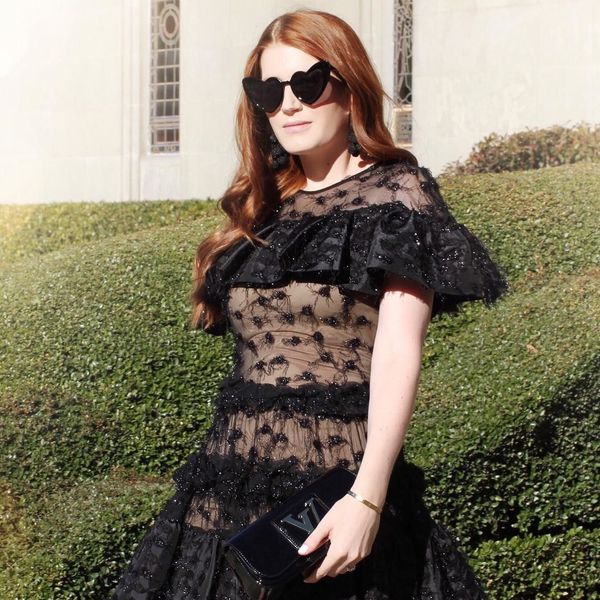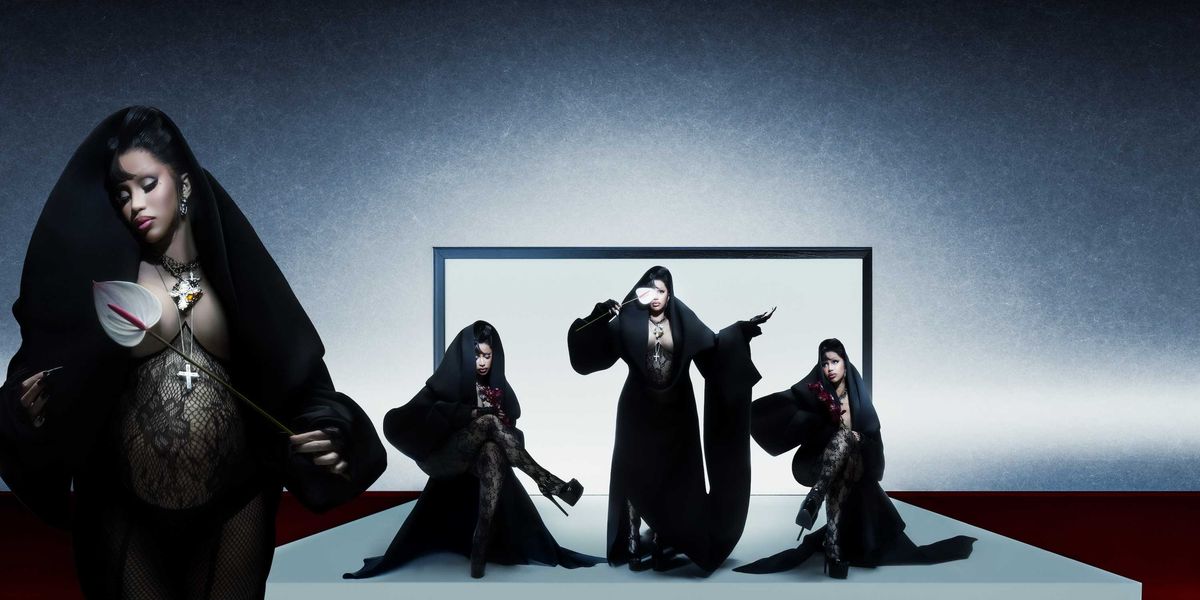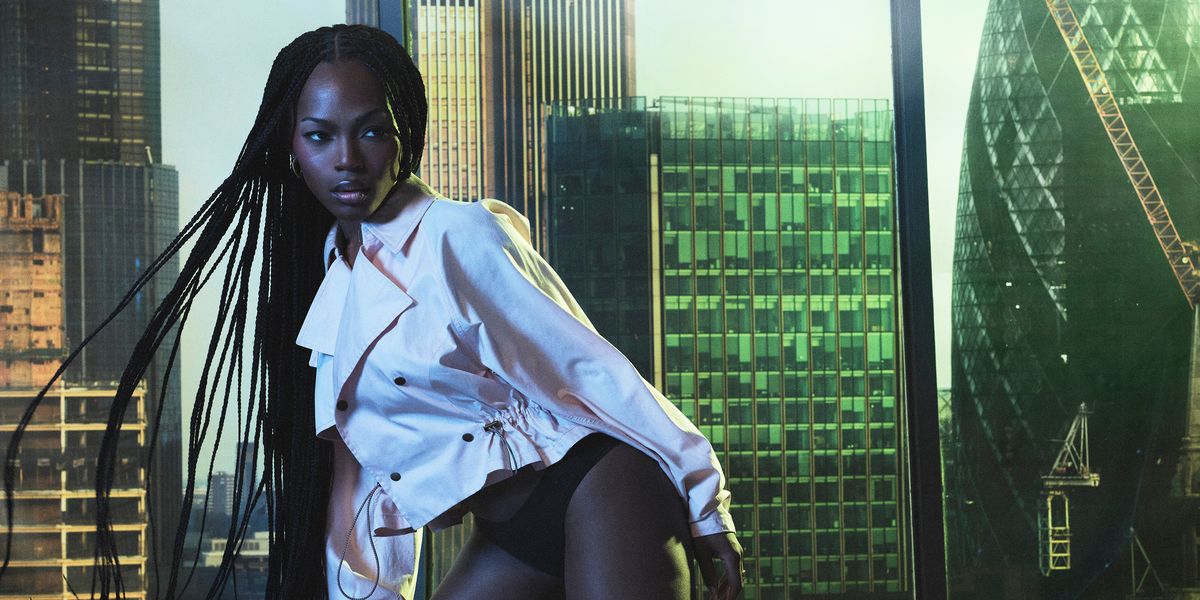
Amber Venz Box on Why Women Rule the Internet
Apr 22, 2019
At the seventh annual, Dallas-based, rewardStyle conference, called #rStheCon, PAPER got a firsthand look at just how far global social media influencers have come in recent years.
RewardStyle is an invite-only tech platform with an engaged influencer database of more than 40,000 people around the world. It provides free data-driven marketing services that help people with ideas, products, or dreams to reach massive markets, partner with global brands, and get their ideas and products out to millions. Sound simple? It isn't.
In 2012, Amber Venz Box co-founded (along with her husband Baxter Box) rewardStyle and its shoppable, consumer-facing LiketoKNOW.it app, to create a space she longed to be a part of. The 30-year-old entrepreneur, who has been named Glamour's Woman of the Year in tech and hit Forbes 30 Under 30 list, was once an aspiring magazine editor. Despite her hard work and talent, Venz Box couldn't get callbacks from her favorite fashion publications, so she did like many frustrated Millennials armed with Blogspot, WordPress, and Tumblr accounts did once upon a time, and started an online hub capturing her daily outfit inspirations and styling tips and tricks, called Venz Edits. As Venz Box slowly grew an organic following, first in the blogosphere, then on platforms including Pinterest and Instagram, she attended national bloggers' conferences to learn how she could better monetize and promote her ideas.
She'd hear shrugged-off bits of advice suggesting she should "keep trying like really hard," and would become even more frustrated. It turns out, frustration was the kernel of inspiration Venz Box needed, and rewardStyle was born. Today, a database of more than 4,500 retailers invest over $100 million dollars into the platform to help sell their products online through the power of influencer marketing. And in turn, the self-sustained business of being an influencer becomes a lucrative one for those utilizing rewardStyle's services: an internal rewardStyle report notes that 83% more influencers using the service earned $100,000+ each in 2017 than in previous years.
PAPER caught up with Venz Box at her hotel before the three-day conference's ballerina-filled (and of course, Instagram-ready) finale party. She candidly discussed the scrappy early days of rewardStyle, how to keep it real online, diversity in tech, and why women rule the internet.
How are you feeling about how things have evolved from when it was a baby dream to now?
Back in 2012, we aimed really high as a team of 12 people running ragged, and we had some of the most influential people in the world there. At the time I called it Forget the Fluff, that was the theme of it. I had been to a blogger conference, I've been to many before, and everybody would get on stage and someone in the audience would ask how they made money blogging. And some girl on stage would go "I try so hard, and you just gotta keep trying like really hard." I would be standing there like, Was that it? Are we really done? Was that really your answer to that question?
And that's where you come in?
I found that no one was ever honest, and whenever people got on stage everyone was just like, Be authentic. But what does that really even mean? You have 100,000 views on your blog, like what does that mean to be authentic? And so we wanted to do something that we felt brought real business value to our clients, but in going up on stage I was just about to throw up. I remember we had a black drape over a pipe in a hotel with low ceilings and not great lighting. The venue could hold maybe 60 to 80 people. There weren't slides on the screen. Regardless, it provided value intellectually. People loved it, and they loved that they got to meet each other from all over the country. It was the beginning of something really cool.
"If my followers love me and what I'm about, then I don't have to sell them the jumpsuit I'm wearing, because they're interested in me, so of course, they'd want my jumpsuit."
Now you have a network of over 40,000 influencers using rewardStyle around the world.
Yes! It's become this flagship event that still is a community-driven event where you are learning from your peers. We actually place people at networking tables because not only are they part of the 200 most influential influencers in the world, but they actually have something that's similar about them. Maybe they're all trying to break into YouTube or they all have a product line, and at the conference, we facilitate those conversations along with the classroom sessions, brand meetings, and mainstage education.
Going back to your point about authenticity, what have you learned about what people using social media or influencer types should and shouldn't show?
The way that the Dallas Cowboys approach this is through incorporating the motto, "don't tarnish the star." That's their way of saying honor your brand when you're building it, because you want people to love your brand. So let's use the Cowboys as an example: if followers or fans love the brand, I don't have to sell them a jersey; they already want that jersey. So I apply that to myself: if my followers love me and what I'm about, then I don't have to sell them the jumpsuit I'm wearing, because they're interested in me and of course want my jumpsuit. It's not about selling something specific, it's about buying into a brand, or in many cases, the person you're interested in.
How does that "don't tarnish the star" logic apply to products though?
It's ultimately about people, no matter what you're selling. Look at Emily Weiss of Glossier. She was one of our top clients for our first five years. She was a blogger! And she used rewardStyle and then headed Into the Gloss, and they won awards with rewardStyle every year. She then wanted to start a beauty line and we were like, That's cool, we'll support you! And now look what it has become, it's incredible. It's built around a person and a perspective and that's the same thing with these influencers, they're buying into a person and a perspective, and people are following people, not just brands. Let's say you've built a following and become a mother and want to show strollers that you're picking out. It's not "now I'm a stroller blogger," but it's literally "this is the stroller that I picked as a new mother to my baby." The Cowboys aren't doing ads on television for their jerseys, but they're making a lot of money off their jerseys. It's because of brand loyalty. That goes a long way. Sometimes, it's what you don't show that is the most interesting to your followers.
For anyone who wants to be influencer, what can they begin doing now to build an engaged following?
Look at the most successful people you follow and scientifically study them. Look at their feed, look at the types of things they post, look at how they caption, how much they post, and then unpack that for yourself. How do you want to get your message across? You also want to be speaking to something that you have an endless amount of content for. I'll use the trite example of a mommy blogger: all you are thinking about is bottles, strollers, carseats, toys, preschools, what to feed your kids, playtime, holiday activities, et cetera. It's endless, so you don't have to wake up every morning and try to create that content because it's happening in your life and if you just share your life, that's a business. It's hard to say you're going to be a fashion blogger today, because if you work at a retail store and can get a new outfit everyday then you are set for that position. But if you don't have an endless budget or some sort of access to wardrobe that you can shoot fresh constantly, then maybe being a fashion blogger is not what you're going to do. Maybe you're going to show what you're wearing, but you actually spend a lot of your time around coffee shops. Maybe your whole deal involves touring the best coffee shops in town, and people just like your clothes because they also happen to like your taste in coffee.
"Girls of all backgrounds from all over the world run the Internet."
So, do you think building an engaged audience is about thinking of zags where others would zig?
I think everyone wants a connection with what they're interested in. That's the thing about authenticity, people use it loosely. It is a real thing, but I have friends who I don't know what their life struggle is, but everyone has a life struggle that they're going through or something they're really excited about, and as you become older and you become busier with your work, you don't always have time to tell people about your life, whether you're buying a house or going through in-vitro multiple times. What you find is that you don't always know that deeper level or double click down within your friends, but as an influencer you need to be that double click in. People don't want to know you tangentially because they know everyone else in their life tangentially — surface level of people having the best overalls or the best lipstick or whatever. You also need to know more about what is happening in their world to care more about that person. That's again where the authenticity piece comes in. Because then tomorrow if you're wearing overalls I don't like, I don't care what you're doing. It's the same thing with influencer marketing, if you throw up a post and you're a home blogger and I think your living room is ugly, I'm not there today. You don't have a chance to sell me your Dr. Pepper.
In documentaries like The American Meme, OG influencers from Paris Hilton to the Fat Jewish talked about the invisible pressure they face to keep up, and how so much of that is based on likes. Do you feel that pressure?
So, we have an internal business intelligence team. They helped me learn what's working and not working, and despite knowing it I still don't do it that well. I know that I need to be looking at Stories with my face having a conversation with somebody, and that's how I'm their friend and I need to be their friend. I am terrified of doing that and I can't make myself do it. And I know that it would help my business, and then also vulnerability. Along with the blogger, I'm also a business owner and I have investors and if my investors think Wow, Amber has had a bad day for three days in a row now. How is she performing at work? There's always things in people's lives that stifle their ability to be as transparent as they'd like to be. Regardless of likes, I try to open up more. And that's because with a blog name I felt like I needed to be more of a media company, and I needed to put out posh content because I know I can and I know how to take a good photo. I felt very stuck, to the point of no action. I started not posting which I have never done, but I was so fearful because the algorithm just makes you feel so poorly and makes you overthink everything. All of a sudden you're worried about not getting enough likes for brands and being embarrassed about posts.
I know what you mean and it's crazy-making. I've even taken posts down if they don't immediately hit certain likes-to-minutes ratios.
That visibility hurts and it paralyzed me to the point of not publishing. I have a manager for my blog business, separate from rewardStyle staff, and she was like Just give people what you're actually doing. I changed my handle to my actual name and started sharing more candid photos.. So this year my husband, who refuses to be an Insta-husband started snapping cute photos of me playing with our kids. Sometimes I post them, sometimes I don't. But before, I was fearful and I was not going to stop during a real moment, like when I'm bathing the kids, just for a perfect photo opp. But it's crazy too because often those are the ones where you get the most engagement. Suddenly people care about your turquoise tub or how you got the baby to sit still long enough for a photo.
Can you tell me a little more about your selection criteria for who attends the conference?
When people come onto rewardStyle what we want the mutual understanding to be is that you are approaching this as a business and you're investing as a business. You can think of it like an incubator: in many tech spaces, there are incubators that take a piece of the business and help you grow, they give you the connections, they make it all happen for you. But return of investment is very important. So if you fit those markers, and you care about growth, you're in.
"Being an influencer is actually not for rich people, because you have to work."
There has been criticism in the past, from those who have been invited and those who haven't, that the conference has been very white. How have you been addressing that?
As an entrepreneur, you can become so focused on literally just the business, like just sitting in the numbers, that we appreciate someone bringing attention to something we are missing. People have blind spots everywhere, and I appreciate whoever brings our blind spots, whatever they might be, to our attention. We brought in HR when we were about 30 people strong and they helped us to understand what we were missing from growing the talent from within our organization. So that sort of started from an early stage.
What is always worth thinking about in considering diverse representation is this: is someone not getting where they want to be because they didn't earn it, or did something else in a flawed system happen to block their opportunity? Look at online spaces, which had until recently, had a huge blind spot in terms of female representation. 80% of the Internet is girls buying online for themselves and other people. Girls of all backgrounds from all over the world run the internet. I guess the reason I'm trying to talk about all this things is... We invite based in performance on the platform, and we used to look at it as a pure hard line of retail sales figures and inviting the top 200. So we weren't thinking beyond that, and then what we realized was we had a platform to champion people and to give people opportunities, so that they can be successful and make the connections that even I wasn't able to make.
I think as rewardStyle becomes more democratized, with content, and people really start honing in on what they want we've made it more accessible for everyone to become successful. And we have 250 people on our team who speak over a dozen languages from all over the world, and we hear all those perspectives too. Now more than ever, diversity is reflected in our consumers: we now have over 4 million active users on the app, so who is that? What does that look like? I think that's been something that's totally transformed our landscape.
What do you feel are some misconceptions about influencer culture in general?
It's easy when you look in a room and see a lot of very well-dressed people who take care of themselves to judge what they're doing. It's easy to say that they have access to money and things that other people don't have, and the reason why people think it's so easy is because they only see pictures of people doing cool things around the world. But the idea that this is easy is 1000% not true. These are the hardest working girls and guys. One of them is Christine [Andrew of Hello Fashion], who came from very humble beginnings when she started blogging at 18 and now has 3.5 kids and lives in a multimillion-dollar home. She also has millions of followers, but what does that look like? She told us it's just her, her husband, her assistant, and they live in Utah. So I think the misconception of becoming an influencer is that it's easy and for rich people. Being an influencer is actually not for rich people, because you have to work.
Do celebrities ever use your service?
One of the biggest fails of several years ago was years ago when we started working with Hollywood talent agents. They wanted all of their celebrities using rewardStyle to grow their platform, and they were interested in the money. We spent so much time in L.A. training everybody and they made no money. It's because they were all just waiting for opportunities to make quick money. And these girls on rewardStyle really grind it out. And again, not everyone succeeds. But the influencers I know became who they are today because when doors closed for them, they'd build windows.
Photos via Instagram
Music
You Don’t Move Cardi B
Story by Erica Campbell / Photography by Jora Frantzis / Styling by Kollin Carter/ Hair by Tokyo Stylez/ Makeup by Erika LaPearl/ Nails by Coca Nguyen/ Set design by Allegra Peyton
Story by Erica Campbell / Photography by Jora Frantzis / Styling by Kollin Carter/ Hair by Tokyo Stylez/ Makeup by Erika LaPearl/ Nails by Coca Nguyen/ Set design by Allegra Peyton
14 October
Entertainment
Matthew McConaughey Found His Rhythm
Story by Joan Summers / Photography by Greg Swales / Styling by Angelina Cantu / Grooming by Kara Yoshimoto Bua
Story by Joan Summers / Photography by Greg Swales / Styling by Angelina Cantu / Grooming by Kara Yoshimoto Bua
30 September
Music
Demi Lovato Is No Joke
Story by Ivan Guzman / Photography by Jason Renaud / Styling by Chris Horan/ Makeup by Loftjet / Set design by Allegra Peyton
Story by Ivan Guzman / Photography by Jason Renaud / Styling by Chris Horan/ Makeup by Loftjet / Set design by Allegra Peyton
15 September
Music
Role Model Isn’t In Kansas Anymore
Story by Tobias Hess / Photography by Richie Talboy / Styling by Angelina Cantú / Grooming by Jerrod Roberts / Set design by Allegra Peyton
Story by Tobias Hess / Photography by Richie Talboy / Styling by Angelina Cantú / Grooming by Jerrod Roberts / Set design by Allegra Peyton
14 August
Internet
Quen Blackwell Takes Over
Story by Ivan Guzman / Photography by Richie Talboy / Styling by Angelina Cantú / Makeup by Kimora Mulan / Hair by Malcolm Marquez / Nails by Kimmie Kyees / Set design by Allegra Peyton
Story by Ivan Guzman / Photography by Richie Talboy / Styling by Angelina Cantú / Makeup by Kimora Mulan / Hair by Malcolm Marquez / Nails by Kimmie Kyees / Set design by Allegra Peyton
11 August




